
 >
>
>
>
2021.11.08
Special Interview with O.H. Kwon, VP & President of Qualcomm Korea
From the 2021 4Q AMCHAM Journal
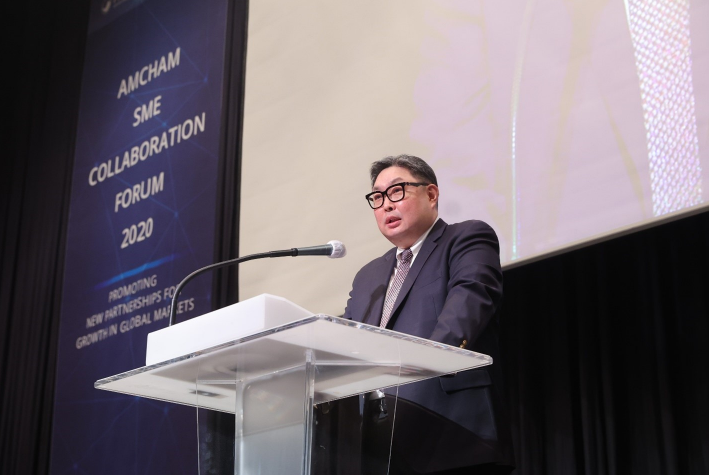
1. Can
you tell us a little about yourself and your journey to your current position?
I am O.H. Kwon, VP & President of Qualcomm Korea. My full legal name is Oh Hyung Kwon – Oh means “five”, Hyung means “go well” and Kwon means “power” so my name itself means 5G goes well powerfully. What a perfect name for Qualcomm Snapdragon 5G! I was born in Seoul in 1971 and moved to Overland Park, KS, in 2001 with an American dream to be successful in the wireless industry with a solution to make regular PDAs function just like today’s smartphones with both cellular voice and data connections. My dream came true with getting the U.S. citizenship in 2011, and I moved back to Korea in 2012 as an executive of Qualcomm, the true global leader of the wireless industry from 2G to 5G.
It wasn’t an easy
path for me at all due to my non-engineering educational background (I got my
bachelor’s degree in education from Yonsei University in Seoul and have a
teaching license in ethics) and lack of verbal English communication skills in
the beginning of my career. I had to cover my weaknesses through extra-long
working hours studying new technologies and engineering issues in English and
taking online MBA classes at the University of Phoenix for Technology
Management while moving around in the U.S. coast to coast. My family and I
lived for three years in the East Coast (Cliffside Park, New Jersey), four
years in the Midwest (Overland Park, Kansas), and five years in the West Coast
(San Diego, California). I thank God and my family for their strong support
throughout my amazing career journey.
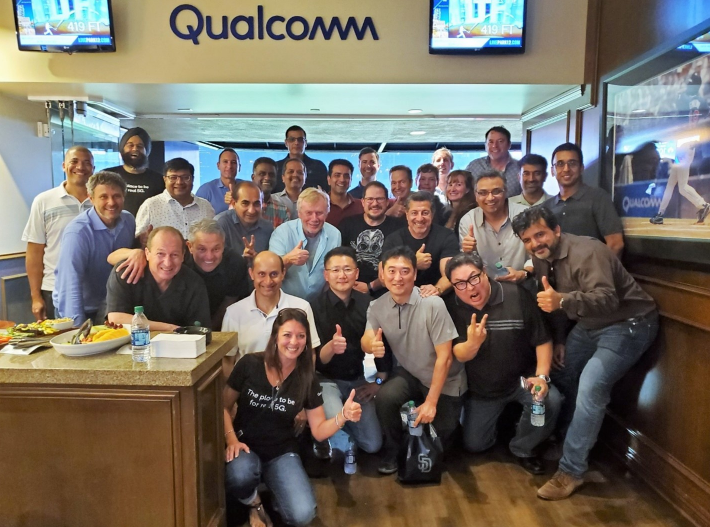
In my current
role since January 2019, I have an overall business and operational
responsibility for Qualcomm Korea, Qualcomm CDMA Technologies (QCT) Korea, and
Qualcomm Korea RFFE, which closely work with Samsung, LG, HKMC, and other
Korean SME customers for Mobile, Compute, Infra, RFFE, Connectivity,
Networking, IoT, and Automotive. I joined Qualcomm San Diego headquarters in
2007 as a regional sales manager for Korea and I was relocated to QCT Korea in
2012 to serve as senior director of Mobile and IoT Sales. I was promoted to VP
of Sales at QCT Korea in 2017 and I have been instrumental in leading a strong
engagement with key Korean OEMs, driving new business opportunities and
establishing an excellent sales track record with my Korea organization during
my 14-year tenure at Qualcomm. Before joining Qualcomm, I was working as
overseas sales manager for LG Electronics for the U.S. and Japan (from 1995 to
2000), VP & GM for the U.S. and Latin America at Yiso Telecom (from 2000 to
2005) and Handset Vendor Manager at T-Mobile (formerly, Sprint from 2005 to
2007). I have been happily living in Seoul with my beautiful family for over
nine years now. I hope all AMCHAM members stay safe and healthy with their
families during this prolonged COVID-19 pandemic situation.
2. You
are currently Vice Chair of the AMCHAM Board of Governors and have led several
events and efforts through AMCHAM. Can you tell us about your experiences so
far? Do you have any goals you would like to achieve through the AMCHAM
platform?
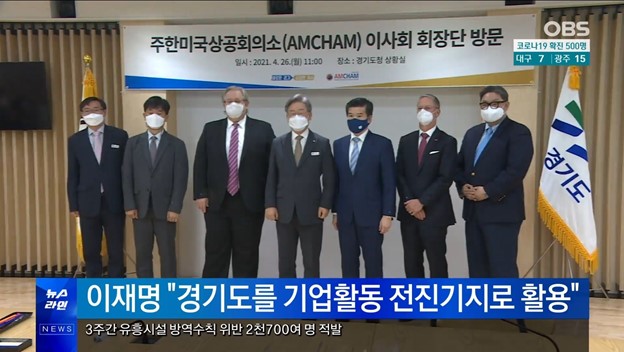
Source: OBS News Line
I think one of AMCHAM’s critical roles is serving as the promotor of U.S. companies’ contributions to Korea. This is critical to U.S. companies that usually have limited access or opportunity of such local communication. Let me take Qualcomm for example. While our business in Korea has numerous interactions with business partners for product and solution development to compete in the global market, it also cuts across very different sectors like government policy implementation.
The essence is that 5G is not just faster smartphones, but a tool to bring intelligence and connectivity to many more devices and areas near the “edge”. With our 5G technologies, Qualcomm can support the government’s economic and industrial policy initiatives. The Korea Digital New Deal is transitioning the country to a digital economy, and our 5G and AI technologies can be used to build the Data.Network.AI (D.N.A) ecosystem and accelerate Digital SOC (Social Overhead Capital.). Fast, reliable and low latency features of 5G will replace the wire to make more flexible and configurable operations in the road transportation infrastructure, public emergency response systems, power utilities, and many more. 5G also helps build smart government by using the extremely high radio frequency called “mmWave” which will greatly help improve the efficiency and security of government operation.
Under COVID, online schooling became the lifeline of education so that no students are left behind from essential education opportunities. The government is constantly improving the public online education system, and our innovative computer platform for laptops and Chromebooks will greatly help allow students to access classes and online learning tools anywhere, anytime. I believe many U.S. companies have made a profound impact on government policy, industry, and people’s day-today lives. Such expansive roles shouldn’t go unnoticed, and I hope AMCHAM will effectively promote them for due recognition and finding new opportunities.
3. In
particular, Qualcomm was instrumental to creating the AMCHAM SME Collaboration
Seminar in 2020. Can you tell us more about how Qualcomm strives to cooperate
with and boost small and medium partners in Korea?
Cooperation with
domestic small and medium-sized enterprises (SMEs) is one of the most important
initiatives for Qualcomm. Since 5G has been commercialized, various types of
devices beyond smartphones have become connected, creating new business
opportunities for SMEs in Korea.
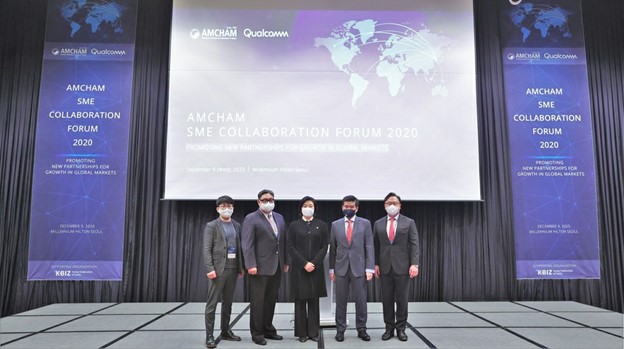
Qualcomm is
supporting various forms to help SMEs with new concepts and competitive
products enter overseas markets. To name a few, Qualcomm annually hosts the
Smart Cities Accelerate at the San Diego headquarters. By inviting various
types of ecosystem partners such as leading manufacturers, operators, and
distribution channels around the world, Qualcomm's SME customers have been
provided the most effective and practical opportunity to enter overseas
markets. This year, a Korean SME company that provides smart city-related devices
and services joined the event, and Qualcomm will help them build out
progressive smart city deployments with streamlined end-to-end capabilities.
Second, Qualcomm
is using its own global business development organization to support domestic
SMEs to advance into overseas markets. By sharing real-time data on the
products and technologies manufactured by Qualcomm Korea's SME customers with
Qualcomm's business development organizations around the world, SMEs are able
to supplement product development and accelerate time to market.
In addition, we
are continuing our efforts to further solidify the structure of growing
together with domestic SMEs, such as the establishment of a Qualcomm design
house that enables the development and commercialization of Qualcomm products
that require relatively large amounts of resources and periodic technical
training.
4. At
their first summit in May of this year, President Biden and President Moon
singled out semiconductors as a top priority for bilateral cooperation. How do
you foresee the U.S.-Korea partnership in semiconductors evolving?
Semiconductors
are key to a wide range of economic sectors from automotive to healthcare,
telecommunications, and many more. The impact of current supply constraints spans
across multiple aspects, and we need to work together to address this, minimize
the impact, and establish a resilient supply.
Our two countries have a long history of close collaboration in semiconductors and delivering leading node processes and technologies. I believe we have ample opportunity ahead to further enhance this collaboration and continue to lead in digital transformation. In that context, I find the two governments’ agreement to collaborate very encouraging, as well as the fact that each country is working to build greater capacity and incentivize R&D and facility investment in semiconductor areas.
The bilateral roundtable discussion also mentioned batteries, automotive, and vaccines, and joint R&D of critical technologies such as 5G / 6G, Open RAN, and so on. Given their wide ramifications, it is very important to continue to explore opportunities in these areas. Qualcomm attended the U.S.-Korea Business Roundtable and raised the issue of the need for enhanced bilateral collaboration on advanced technologies. We will be happy to offer our support in the area whenever needed.
5. Qualcomm
also supports education in diverse ways – one example is the Korea Robot
Championship that Qualcomm sponsors to help Korean youth develop
problem-solving skills. Can you tell us more about your CSR programs?
Qualcomm’s
corporate responsibility priorities include four areas where we believe we can
make the greatest impact — Purposeful Innovation, STEM Education, Responsible
Business and Our People.
In Korea, we
focus our efforts on leveraging our technology for good, through our Qualcomm®
Wireless Reach™ program and Science Technology Engineering, and Math or STEM
education programs. STEM is the foundation for everything Qualcomm does. STEM
supports the brainpower behind the breakthrough technologies and inventions we
bring to life. As a leader in technology, Qualcomm is committed to providing
future innovators with the skills and knowledge to solve global challenges.
That is why we
funded STEM organizations like FIRST (For Inspiration and Recognition of
Science and Technology) who, before the pandemic, typically reached 650,000
students across nearly 110 countries globally each year. Korea Robot
Championship is the local partner of this global program, which we have
sponsored for six years in a row.
In addition,
Qualcomm has other STEM programs for college students. We host the “Qualcomm IT
Tour” for a group of 25 outstanding Korean undergraduate and graduate students
majoring in science and engineering. Launched in 2003, the Qualcomm IT Tour was
designed to nurture and inspire young leaders in science and engineering fields
by providing them with firsthand access to a leading global corporation
headquarter, its executives and its cutting-edge technologies and products, as
well as connecting their interests and talents to real-life scenarios and
experiences. We plan to resume this program next year after it was paused due
to COVID.
Also, the Qualcomm Innovation Fellowship is a
form of an applied paper contest for students currently in master’s and
doctoral degrees. The program aims to encourage science and engineering
students to pursue autonomy and expertise in research activities and to help
them derive creative ideas. There is also a place for knowledge exchange where
the participants can interact with researchers of Qualcomm and obtain advice.
I am very pleased
that we support our youth to participate in the program that I hope to inspire
them to join the next generation of inventors.
Meanwhile,
Wireless Reach brings advanced wireless technologies to people and communities
who need it most. These programs demonstrate pioneering uses of our company’s
mobile innovations to help drive human and economic progress in underserved
areas globally. Our programs have benefited more than 20 million people in 49
countries on five continents since 2006.
In Korea, we have
a history of implementing programs that enhance the delivery of healthcare,
enrich teaching and learning, and most recently started collaborating to
provide aid in public safety. Earlier this year, we launched the Smart City
Safety Net, a program that introduced a Smart Cities solution to promote public
safety. Leveraging smart wearable devices, participating beneficiaries can
immediately alert authorities about emergency situations and obtain timely and
effective responses. At Qualcomm, we understand that mobile technology has an
important role to play in helping address society’s biggest challenges, and we
are excited to establish a holistic government emergency response system to
make communities safer.
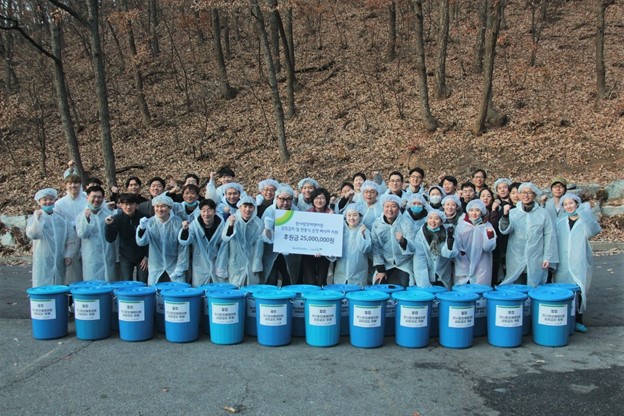
6. What
can we expect from Qualcomm in the next year?
As of July 1,
Cristiano Amon took up his post as the CEO of Qualcomm. Under his strong
leadership, Qualcomm is moving beyond mobile into areas such as Automotive,
Infrastructure, Robotics, XR and IoT with a comprehensive roadmap portfolio
across all products. Also, Qualcomm will contribute to the acceleration of
“Digital Transformation” where an ever-increasing number of intelligent edge
devices are connected to the cloud with proven technologies, including 5G
mmWave and on-device AI.
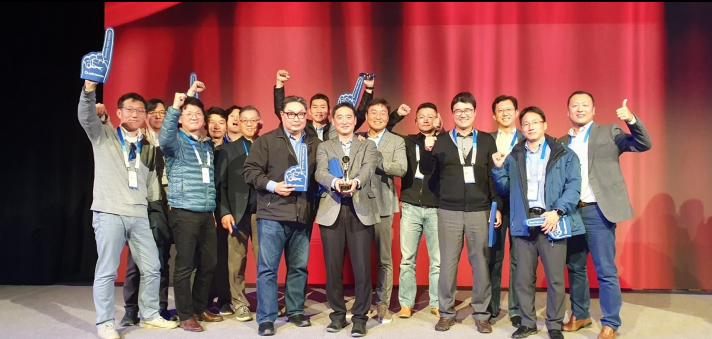
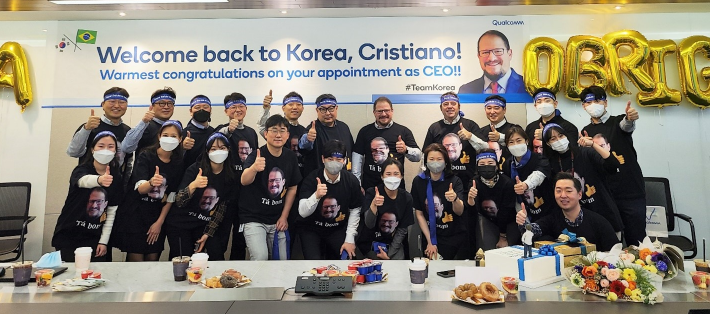
5G is not just the next generation of fast internet but the solution that binds everything to always be connected in the cloud. Industry will benefit from massive 5G opportunities for Automotive, industrial IoT and the connected enterprise. Qualcomm Korea is fast-moving into this trend and actively working with various partners, including both SMEs and global players. Since 5G, which will play a pivotal role for Digital Transformation, can be most impactful when we take full advantage of its capabilities including mmWave, efforts on nationwide 5G mmWave commercialization and its supporting devices should continue in Korea, and we will continue to endeavor to expedite its realization.
Last but not the
least, Qualcomm strives to build a community for Snapdragon Insiders (fans for
Snapdragon). In Korea, we communicate with our Insiders on Instagram
(@snapdragon_kr) and YouTube (@snapdragonkr). We share the latest information
and provide extra perks for our fans. Those activities will continue and become
stronger next year.
7. You
have been with Qualcomm for over 10 years and now serve as President. Can you
tell us about your proudest moment?
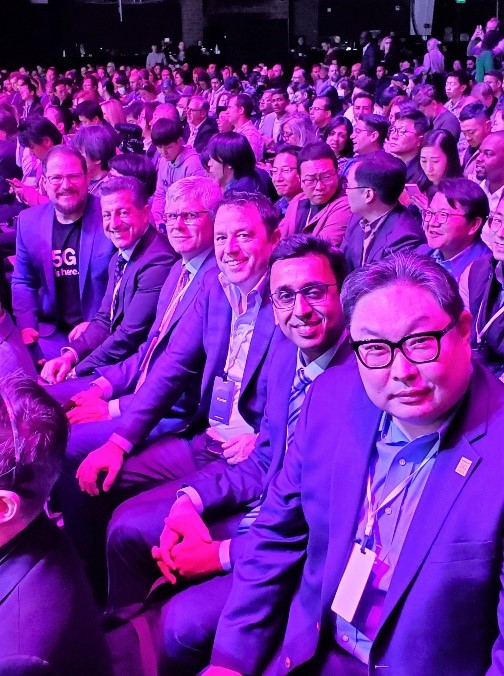
When the United States President visited South Korea in June of 2019, I was truly honored to attend his business roundtable with other corporate leaders of Korea and the U.S. with help from Qualcomm’s strong leadership with 5G and support from the U.S. Embassy and AMCHAM Korea. My dad, who passed away early this year, was so proud of me when I shared the list of attendees, and my mom almost cried when she saw the photos I took with them – I can say that was the proudest moment of my Qualcomm career so far.
At that very event, AMCHAM Chairman & CEO James Kim personally introduced me to multiple Korean C-level executives, and I was able to build new business relationships. I appreciate his support for me and Qualcomm. Serving as Vice Chair at AMCHAM is also a great honor and it will surely be one of my proudest titles.
O.H. (Oh Hyung) Kwon is vice president and president of Qualcomm Korea YH. In this role, Mr. Kwon has an overall responsibility for Qualcomm Korea operations, Qualcomm CDMA Technologies (QCT) Korea, and Qualcomm Korea RFFE. Mr. Kwon joined Qualcomm in 2007 as a regional sales manager for Korea. In 2012, he moved to QCT Korea and served as senior director of Mobile and IoT Sales, and most recently as vice president of Sales. During his tenure at Qualcomm, he was instrumental in leading a strong engagement with key OEMs, driving new business opportunities and establishing excellent sales track record with his team.